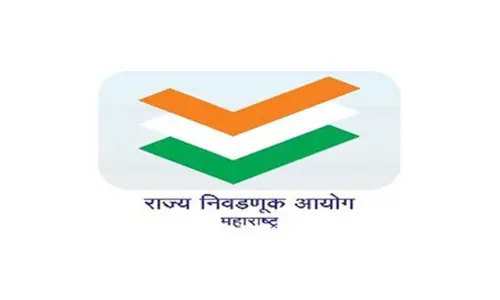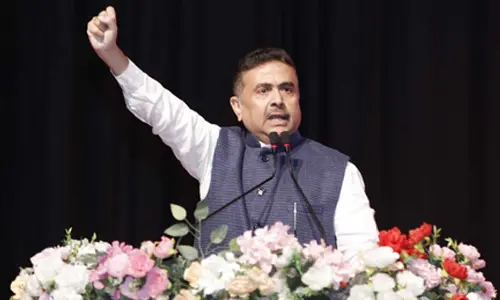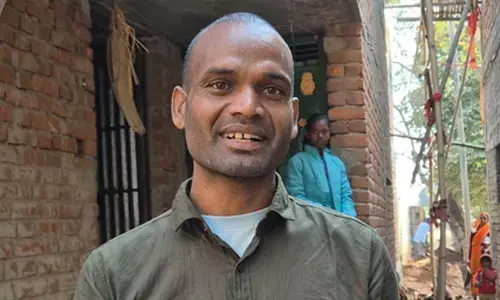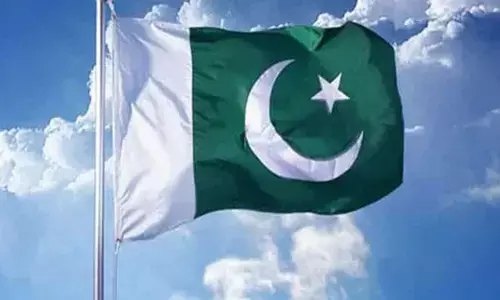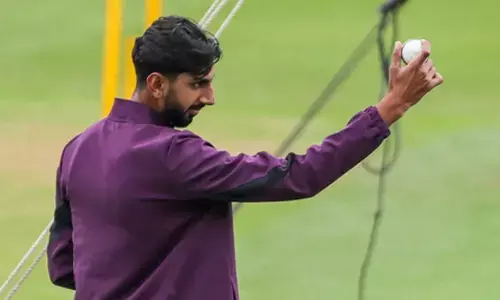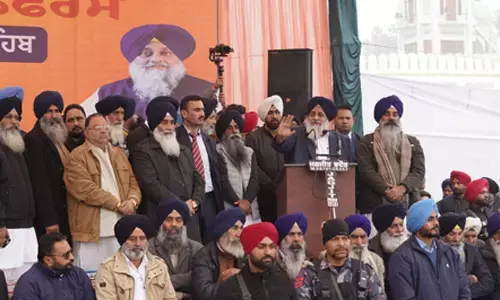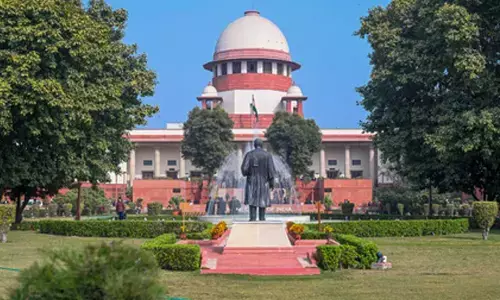The wounded poet
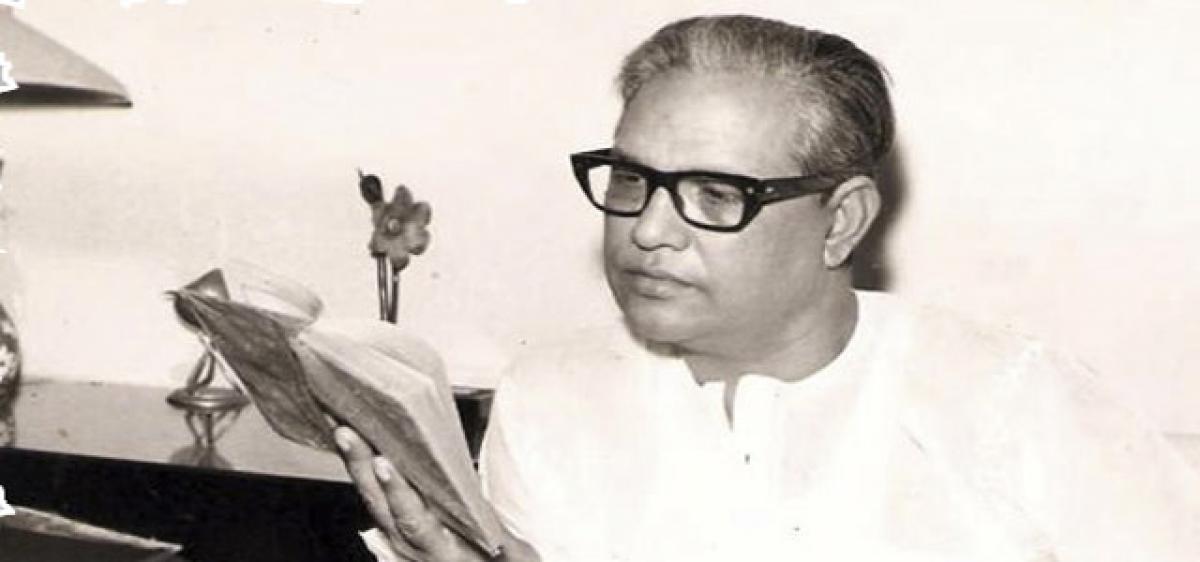
Like the sun outshines other celestial bodies, literary figures are liable to find that their contribution to popular forms of mass media will obscure all their other work, no matter how much better they consider it.
Asrar ul Hasan Khan popularly known as 'Majrooh Sultanpuri' associated with the industry from the mid-1940s till his death in 2000. He became the first lyricist to be conferred the Dadasahab Phalke Award, the highest honour in Indian filmdom, in 1993
Like the sun outshines other celestial bodies, literary figures are liable to find that their contribution to popular forms of mass media will obscure all their other work, no matter how much better they consider it.
This Urdu poet, drawn into working in Bollywood, is a prominent example with his (extensive) filmy output better known than other gems like: "Main akela hi chala tha jaanib-e-manzil magar/Log saath aate gaye aur karvan banta gaya."
But that is not to say that the Bollywood contributions of Asrar ul Hasan Khan 'Majrooh Sultanpuri' were ephemeral. Associated with the industry from the mid-1940s till his death in 2000, he debuted with lyrics for what would be KL Saigal's last film (including "Jab dil hi toot gaya.." which so moved the legend that he wanted it to be played at his funeral) to sending listeners his grandchildren's age jiving in the 1990s with songs like "Pehla Nasha..." and "Janam Samjha Karo".
Among the quartet of Sahir Ludhianvi, Shakeel Badayuni and Shailendra, he outlived and outperformed all of them with his nearly 4,000 songs for about 350 films. He also happened to be the first lyricist to be conferred the Dadasahab Phalke Award, the highest honour in Indian filmdom, in 1993 (it was only in 2013 that Gulzar became the second). On the other hand, he only received one Filmfare Award in his whole career (for "Chahunga main tujhe…" in ‘Dosti’, 1964).
However, all these accomplishments pale before his greatest contribution – along with Faiz Ahmed 'Faiz' – to the cause of Urdu poetry. This was these committed revolutionaries' decision to disobey orders to abandon the "ghazal".
But let us know more about the man. Details about Majrooh's early life are contradictory, with his year of birth in different accounts ranging from 1915 (as per Urdu scholar Khaliq Anjum, who cited the poet as telling him), 1919 (a journalist quoting his son) to 1922.
There is confusion whether his father, of Pashtun descent, was an inspector of police or sub-inspector, and if his traditional schooling was due to his father's distrust of modern studies or to their financial condition.
After becoming an "alim", he trained as a unani hakim in Lucknow, began practice, and participated in local "mushairas" where he impressed the audience. It was here he came to the attention of Ali Sikandar "Jigar Moradabadi" who became his "ustad".
Majrooh was attending a mushaira in Bombay (now Mumbai) in 1945, when he was approached by noted film producer AR Kardar but rebuffed. Kardar then sought the intervention of Jigar, who convinced his protégé that this career would help support his family. Then he impressed Naushad to get his break with ‘Shahjahan’ (1946).
But a member of the Progressive Writers' Association, his fledgling career nearly ended when he was arrested, along with Balraj Sahni, in 1949 for leftist links and imprisoned for two years. However, he continued his career without any problems.
A bigger issue was the party diktat that the ghazal was a "feudal remnant" and unsuited to articulating class consciousness. But Majrooh and Faiz opposed it, contending this form could feature a new idiom and imagery without losing its lyrical nature. Happily for legions of poetry-lovers, they prevailed with even their critics ultimately conceding their point.
Let us see for ourselves some examples of his craft. There is "Jala ke mashal-e-jaan ham junoon sifat chale/Jo ghar ko aag lagaye hamare saath chale", or "Bula hi baithe jab ahl-e-haram to ae 'Majrooh'/Baghal mein ham bhi sanam ka hath chale" or even "Rok sakta hame zindan-e-bala kya 'Majrooh'/Ham to avaz hain deewar se chhan jaate hain" and "Dekh zindaan se pare rang-e-chaman josh-e-bahaar/Raqs karana hai to phir paaon ki zanjeer na dekh".
Or with more common tropes, in his style, become "Bacha liya mujhe toofan ki mauj ne varna/Kinare vaale safina mera dubo dete" or "Mere sang-o-khisht se tameer-e-bam-o-dar/Mere hi ghar ko shahr mein shamil kaha na jaaye" or "Taqdeer ka shikva be-maani jeena hi tujhe manzoor nahi/Aap apna muqaddar ban na sake itna to koi majboor nahi".
Majrooh always retained a lyrical cadence. Another couplet in the tarz of the example quoted in the beginning goes: "Jis taraf bhi chal pade ham aabla payaan-e-shauq/Khar se gul aur gul se gulsitaan banta gaya". Then there is "Shab-e-intezar ki kashmakash na pooch kaise sahar hui/Kabhi ik chiraag jala diya kabhi ik chiraag bujha diya".
But the biggest enemy ultimately turned out to be the growing indifference of the listeners as well as creeping polarisation which did not even spare language. As he mournfully said: "Zabaan hamari na samjha yahan koi 'Majrooh'/Ham ajnabi ki tarah apne hi watan mein rahe".








